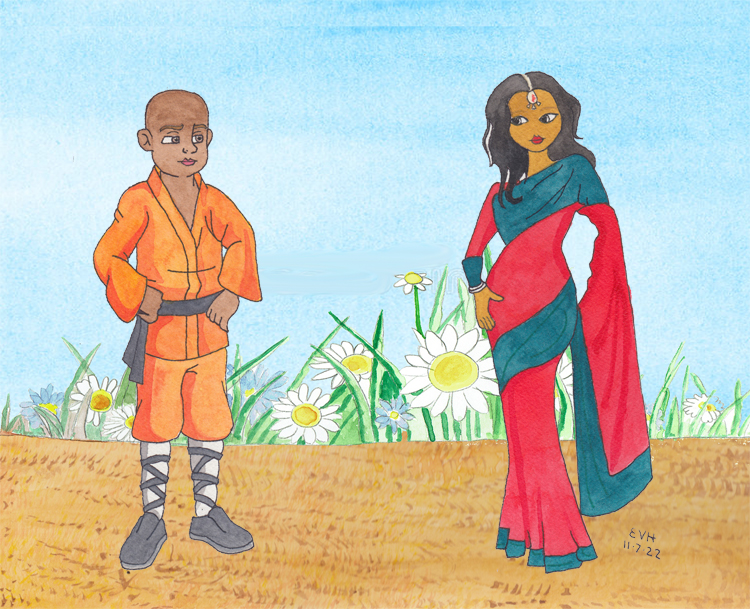
Jataka 392
Bhisapuppa Jātaka
The Lotus Root
as told by Eric Van Horn
originally translated by H.T. Francis and R.A. Neil, Cambridge University
originally edited by Professor Edward Byles Cowell, Cambridge University
This is a curious little tale in which the Bodhisatta has an interaction with a goddess. She accuses him of stealing the scent of a lotus. Meanwhile another man is chopping up lotus roots. He asks her why she admonishes him while saying nothing to the other man. She says that she expects such poor behavior from the other man, but she expects better from the Bodhisatta. Then he asks her to admonish him in the future if she catches him again acting in such an improper way. But she dismisses him, saying that it isn’t her job to look after his behavior (!).
“You were never.” The Master told this story while he was living at Jetavana. It is about a certain monk. The story is that the monk left Jetavana and went to live in the Kosala kingdom near a certain wood. One day he went down into a lotus pool, and seeing a lotus in flower, he stood to leeward and smelled it. Then the goddess who lived in that part of the forest frightened him saying, “Sir, you are a thief of odors. This is a kind of theft.”
He went back in fear to Jetavana. There he saluted the Master and sat down. “Where have you been staying, brother?” “In such and such a wood, and the goddess there frightened me.” The Master said, “You are not the first one who has been frightened by a goddess when smelling a flower. Sages of old have been frightened in the same way.” And at the monk’s request, he told this story from the past.
Once upon a time when Brahmadatta was reigning in Benares, the Bodhisatta was born into a brahmin family that lived in a village in Kāsi. When he grew up, he learned the arts at Takkasilā University. Afterwards became a recluse, and he lived near a lotus pool.
One day he went down into the pool and stood there smelling a lotus that was in full flower. A goddess who was in a hollow in a trunk of a tree startled him, speaking the first stanza:
You were never given that flower you smell, though it’s only a single bloom,
’Tis a species of larceny, reverend sir, you are stealing its perfume.
Then the Bodhisatta spoke the second stanza:
I neither take nor break the flower, from afar I smell the bloom.
I cannot tell on what pretense you say I steal perfume.
At the same moment a man was digging in the pool for lotus fibres. He was breaking the lotus plants. The Bodhisatta saw him said, “You call a man thief if he smells the flower from afar. Why do you not speak to that other man?” And he spoke the third stanza:
A man who digs the lotus roots and breaks the stalks I see,
Why don’t you call the conduct of that man disorderly?
The goddess, explaining why she did not speak to him, spoke the fourth and fifth stanzas:
Disgusting like a nurse’s dress are men disorderly,
I have no speech with men like him, but I choose to speak to thee.
When a man is free from evil stains and seeks for purity,
Misdeed like a hair-tip shows on him like a dark cloud in the sky.
So alarmed by her the Bodhisatta in emotion spoke the sixth stanza:
Surely, fairy, you know me well, to pity me you deign,
If you see me do the like offence, pray speak to me again.
Then the goddess spoke to him the seventh stanza:
I am not here to serve you, no hireling folk are we,
Find, brother, for yourself the path to reach felicity.
So exhorting him she entered her own abode. The Bodhisatta entered into deep meditation and was born in the Brahmaloka world.

Figure: The monk and the goddess
The lesson ended, the Master taught the Four Noble Truths. At the end of the teaching, the monk attained stream-entry. Then he identified the birth: “At that time the goddess was Uppalavaṇṇā,and I was the recluse.”
(Uppalavaṇṇā was one of the Buddha’s foremost nuns.)
